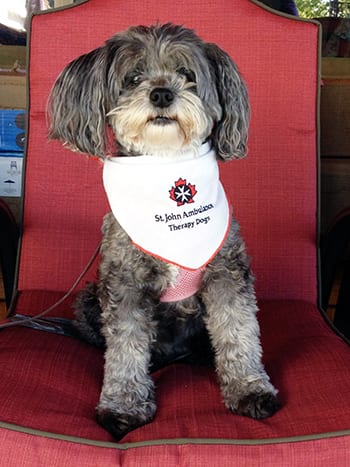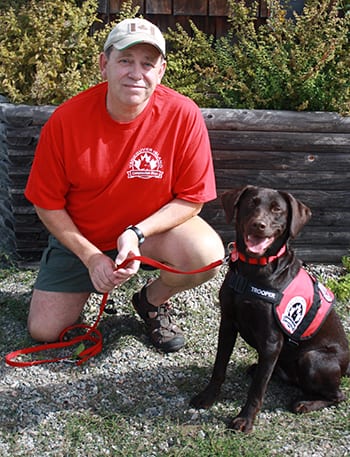As little hands stroke his ginger, furry body, Desi rewards the boy’s petting with louds purrs of appreciation, his eyes half-closed in relaxation.
“Desi helps me stay happy,” says the child, who has been diagnosed with autism. “He helps me read out loud and he doesn’t laugh at me when I make mistakes.”
Therapy animals like Desi provide a valuable bond for children and adults living with challenges by providing comfort, companionship and unconditional love. Adopted from the Vancouver SPCA in 2010, Desi helps his guardian Vanessa Goncalves in her work as a behavioural interventionist with children with autism, and is one of many former SPCA shelter animals who help make life better for others.
“Most people are surprised to discover that I use an animal in my sessions – and they’re even more surprised to learn it’s a cat,” says Goncalves. “A lot of people think of cats as independent creatures but Desi connects with people in ways that no human ever could.”
A longtime volunteer at Sunny Hill Health Centre at BC Children’s Hospital, Goncalves noticed how the children lit up when playing with some dogs at a local park, and she also observed how mellow Desi was with her young brother, lying patiently as he rolled toy trucks up and down his body.
She decided to get him certified and, after being screened and receiving training, Desi started coming with her to her appointments. Goncalves says having a therapy cat present helps to decrease feelings of isolation and alienation – something people with autism commonly feel.
“Desi’s presence encourages communication and socialization and provides a comfortable environment for the children,” she says. Goncalves has observed the difference Desi has made with her clients – from increasing their focus and self-confidence to helping them to overcome speech and emotional delays or behaviours.”
Goncalves says the children’s initial reaction to Desi varies. “Some are anxious at first, some are curious but cautious, while others run right up to him and want to hug him. But the end result is always positive. Desi has a way of knowing the right time to move closer to the child, the right time to touch the child and the right time to snuggle,” Goncalves says. “He truly understands the meaning of patience and he will earn your trust no matter how long it takes.”
Desi ‘s presence is also motivational, says Goncalves, noting that children tend to listen better when they know they will be rewarded with some Desi snuggles. He encourages by example as well. “Desi loves the water and I’ve been able to help some of my clients who are fearful of water or afraid to take baths by showing them photos of Desi swimming at the beach. They see that if he can do it, they probably can too.”
Adds Goncalves: “The only challenge I ever have is leaving at the end of a session. The kids never want to say goodbye to him. I’ve even had children tell me I can leave but the cat has to stay.”
Like Desi, many former SPCA shelter dogs are now serving as therapy animals. Copper, a Labrador mix who was adopted from the North Cariboo SPCA Branch in 2005, was Prince George’s first therapy dog. Her guardian Judi Dowson says it took her three years to convince St. John Ambulance that Prince George needed a therapy dog unit, and when representatives came to evaluate four dogs for the program, one was Copper, who “passed with flying colours”.
Dowson notes that as soon as Cooper’s bandana went on, “she was so excited because she knew she had a job to do.” While Dowson has retired Copper due to an age-related physical condition, she used to regularly visit two care facilities where the mostly senior residents welcomed her with open arms. Dowson adds that St. John Ambulance-trained therapy dogs are also being used to help children learn to read through their Paws 4 Stories program, and to visit college students during high-stress exam times.
She encourages anyone who has adopted an animal from the BC SPCA to think about certifying their pet as a therapy animal if they think they have the temperament for it. “Studies show that holding or petting an animal helps to lower blood pressure, release strain and tension, and can ease feelings of loneliness and depression,” says Dowson. “Not only do the dogs and residents benefit, but the handler gets a wonderful feeling of satisfaction, especially seeing all the smiles on people’s faces.”
Breanne Cote, a realtor in Prince George, also had her two dogs, Hudson and Mac, certified through St. John Ambulance. She and her family adopted Mac from the BC SPCA three years ago, and he loves going on visits with his fur-brother, Hudson, to Rainbow Lodge, every week, where they bring smiles and laughter to the facility’s residents.
Because many of the residents at Rainbow Lodge have Alzheimer’s or dementia they might not always remember Cote but they remember her furry friends. “They remember the dogs and the dog’s names more than mine,” Cote says. “Mac is always happy, his tail wagging the whole time while Hudson is the calm, collected big guy. One resident was nervous at first – it took her several weeks to touch Mac. One day, she did and she didn’t want to stop.”
 Another dog adopted through the BC SPCA’s North Cariboo branch in 2009, Midnight, also serves as a therapy dog, having undergone the St. John Ambulance training with his new guardian, Sue Teschuk.
Another dog adopted through the BC SPCA’s North Cariboo branch in 2009, Midnight, also serves as a therapy dog, having undergone the St. John Ambulance training with his new guardian, Sue Teschuk.
“Midnight used to be very fearful of new people and new situations but he has overcome that and has proven an integral part of a dog therapy program for four years now,” says BC SPCA North Cariboo Branch manager Jamie Walsh. “He makes regular visits socializing with the residents of the Jubilee Lodge and Parkside Care Centre, where he shows off his many talents, such as sit, stay, roll over, speak and dance. He even enjoys the occasional wheelchair ride with the elderly residents.”
Some dogs adopted from the BC SPCA’s Vancouver Branch have worked as assistance dogs with Pacific Assistance Dogs Society, where dogs are trained to work with people with physical disabilities, people who are deaf or hard of hearing, or – in a case that made headlines earlier this year – to help youngsters when testifying in court.
Others SPCA dogs have been adopted by Vancouver Island Compassion Dogs (VICD), an organization that helps military veterans suffering from post-traumatic stress syndrome (PTSD) by pairing them with dogs who help them make it through each day.
“Our dogs help to integrate veterans back into everyday life, and they are trained to help them with PTSD symptoms, like waking (a veteran) up if they’re having nightmares or night terrors,” says Barbara Ashmead, chief executive officer of Vancouver Island Compassion Dogs. “The dogs help to keep veterans stay calm and to feel comfortable going out – for one veteran, having a therapy dog allowed him to finally go grocery shopping again.”
She notes that veterans may not want to talk about themselves or their experiences, but with a dog present, conversations tend to focus on the animal, not the individual. The therapy dogs also help break veterans out of negative thought patterns and help them “dial down” their PTSD symptoms, says Ashmead. Both dog and veteran go through an extensive training process that includes venturing into public places, and taking public transit.
 Brian, a veteran of 27 years and many deployments, is halfway through his training with Trooper, a chocolate Labrador VICD adopted from the BC SPCA’s Port Alberni-Clayoquot Branch in late 2014. They were matched as a training team this past March, and have already formed a strong bond and friendship – despite the fact that Trooper used to be terrified of male humans.
Brian, a veteran of 27 years and many deployments, is halfway through his training with Trooper, a chocolate Labrador VICD adopted from the BC SPCA’s Port Alberni-Clayoquot Branch in late 2014. They were matched as a training team this past March, and have already formed a strong bond and friendship – despite the fact that Trooper used to be terrified of male humans.
“There are two specific areas she helps me. First, she realizes when I’m down, getting frustrated or starting to go into an anxiety attack,” Brian says of his canine helper. “She comes up to me very close and starts licking me – this helps distract me and allows me to ground myself.”
The second area Trooper helps is with blocking – when Brian gives the command “front” or behind”, Trooper will place herself to block someone who is too close for Brian’s comfort, and alert him if someone is walking behind him. She’ll also “sweep” a room to provide him with added comfort and assurance when entering a strange place.
“I used to ‘hermitize’, or stay in the house for weeks at a time, never wanting to go out of my safety bubble. With Trooper, I am forced to go out,” Brian says. “She gives me the confidence to go for walks in the open street, or in the woods, and to enter crowded areas without becoming hyper-vigilant. I can also use her as an excuse to leave a situation where I feel overwhelmed by saying ‘nature calls, I have to take her out,’” he says.
Having Trooper around has changed his life for the better, Brian says, noting that he still has his ups and downs, but “more ups than downs” these days. “I enjoy getting out and meeting people, socializing and feeling ‘normal.’ (Before Trooper), I couldn’t travel or go anywhere without my wife. Now, Trooper goes with me everywhere, to the bank, to the store, to the coffee shop,” Brian says. “My wife has noticed that I’m in a much better mood – not as angry, and I even laugh more. I mean, how can I not laugh when, at 9 p.m. every night, a 52-pound dog slowly creeps up on my lap while I’m watching TV to give me a cuddle and a lick?”
PTSD isn’t something that is easy to talk about, and every veteran’s story is different, Brian notes.
“Lots of people don’t understand it and sometimes you just want to shrink away. Having a trained therapy animal helps you move forward,” he says. “I love to go for walks on the beach in the early morning, watching Trooper run free and come running back to me with that eager look, at the slightest whistle. I believe when a veteran is ready, there is an animal waiting for him and together, they will rescue each other.”
Interested in adopting an animal from the BC SPCA? Check out our online database of adoptable animals!
The British Columbia Society for the Prevention of Cruelty to Animals is a not-for-profit organization reliant on public donations. Our mission is to protect and enhance the quality of life for domestic, farm and wild animals in B.C.
